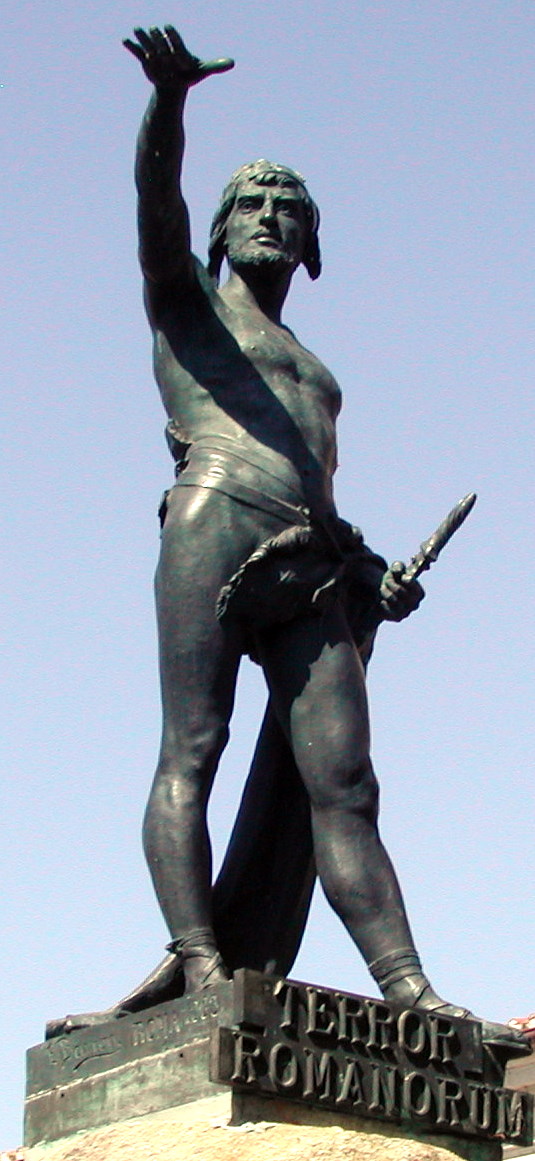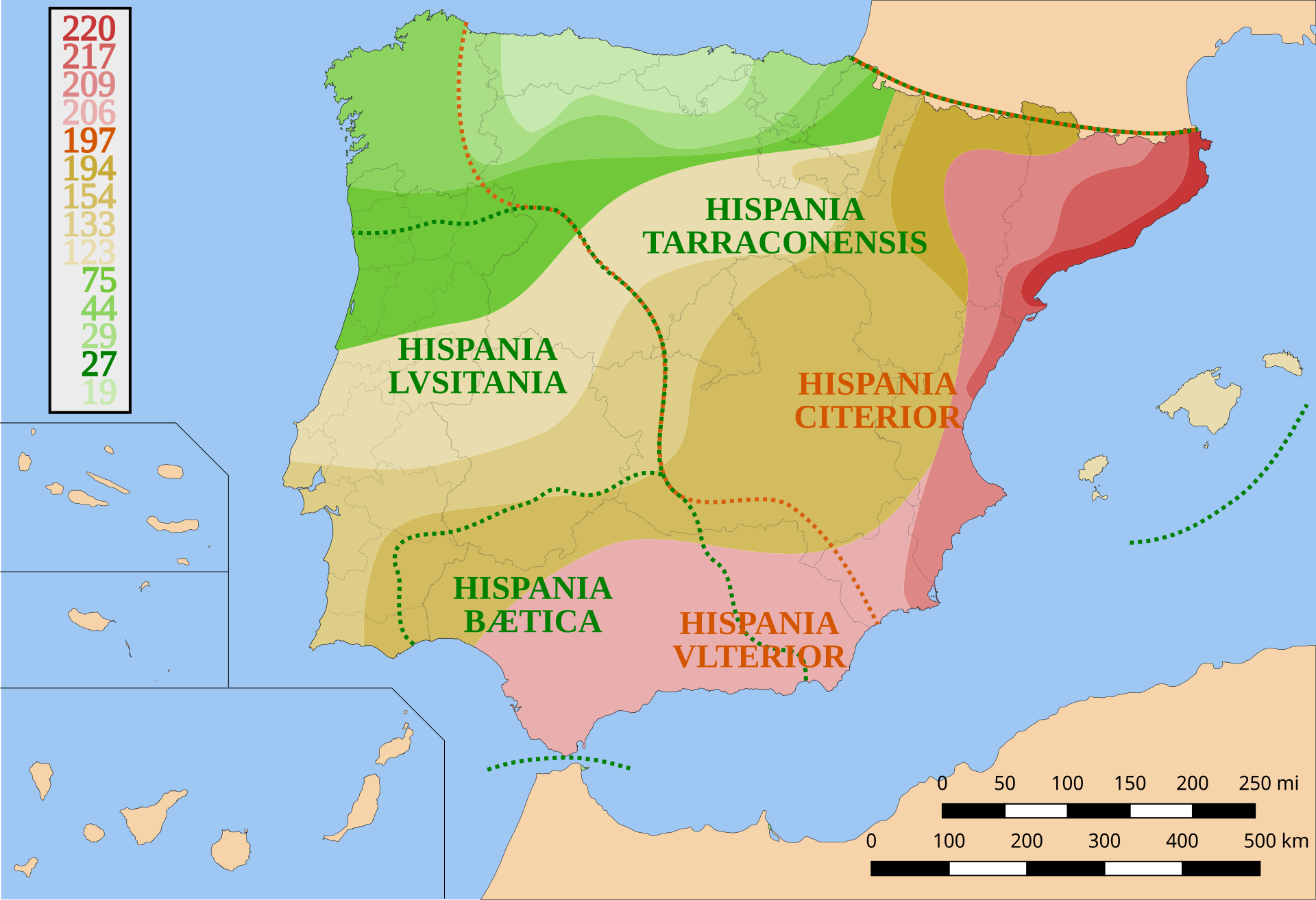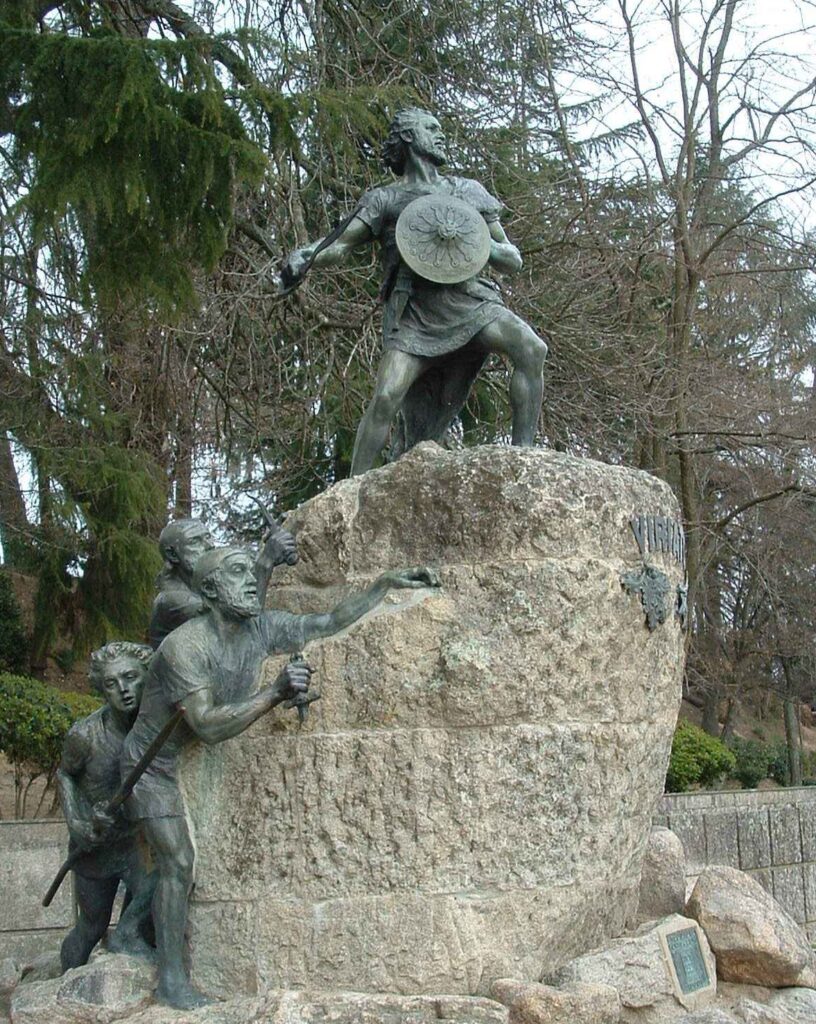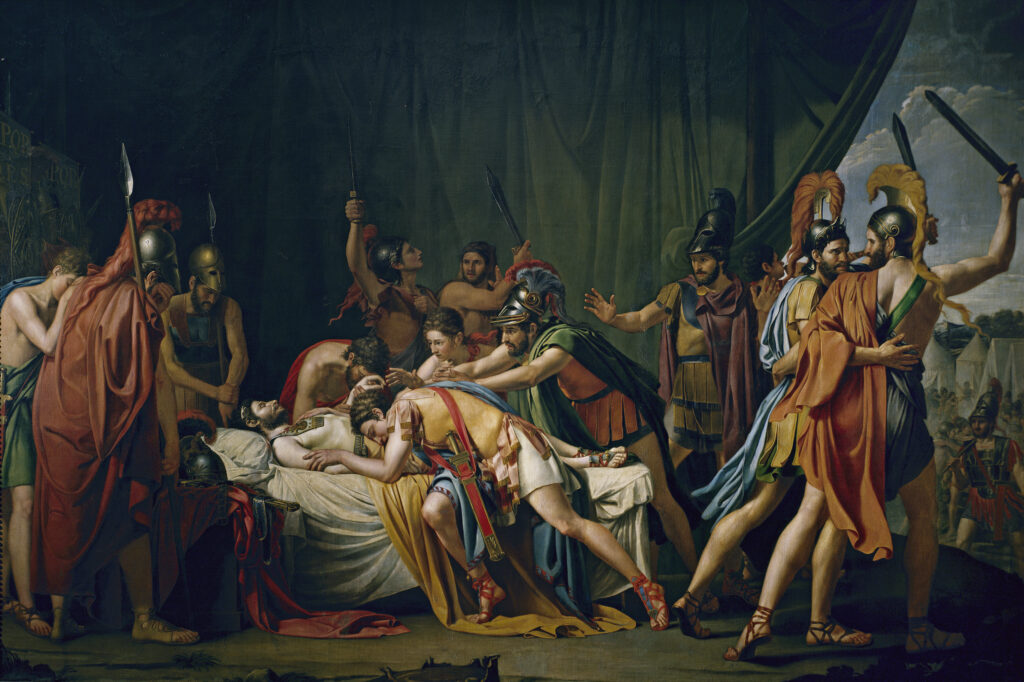
Years: 180 BC – 139 BC
Characteristics: Guerrilla Warfare, Leadership, Resilience
Location: Lusitania/Hispania (Present-day Portugal)
Ogham Correlations: Coll (Hazel), Nion (Ash), Eadha (Aspen), Ur (Heather)
Symbols: Lusitanian Spear, Mountain, Wolf, Oak Tree
Other names: Viriatus, Viriato, Defender of Lusitania, Champion of the Lusitanians, The Shepherd Warrior, Terror of the Romans
The Shepherd Who Defied an Empire
Under the shadow of ancient oaks in the rugged terrain of Lusitania, a young shepherd named Viriathus watched as Roman legions marched through his homeland. This was not just the invasion of a land; it was an assault on a way of life, a culture, and a people. From these humble beginnings rose a leader who would become Rome’s greatest adversary in the Iberian Peninsula.
Early Life
Viriathus, born in the heart of Lusitania, emerged from humble beginnings to become one of the most revered figures in the fight against Roman expansion. Though not extensively documented, various sources hint at a simple yet formative existence, deeply connected to the rugged landscapes of what is now Portugal. As a shepherd, he developed an understanding of the land and survival skills, which later proved crucial in his military tactics.
The Massacre of the Lusitanians

The Massacre of the Lusitanians in 150 BC, orchestrated by the Roman consul Servius Sulpicius Galba, was a defining moment in the life of Viriathus during a period of heightened tension and conflict between the Roman Republic and the various tribes of the Iberian Peninsula.
The Roman Republic had turned its attention to the Iberian Peninsula, which was rumored to be rich in resources and strategically positioned. The Lusitanians, known for their fierce independence, were among the tribes that resisted Roman incursions.
Galba called for a meeting under the pretense of offering peace and fertile land to the Lusitanian tribes. This proposition appeared to be a gesture of reconciliation and a step toward peace. Thousands of Lusitanians, wearied by years of conflict, were enticed by this offer and gathered in response to Galba.
However, this assembly was a meticulously planned trap. Once the Lusitanians were assembled and in a vulnerable position, Galba’s forces launched a sudden and brutal attack. Unarmed and unprepared, thousands of Lusitanians were slaughtered while the survivors were sold into slavery. This act of betrayal decimated a significant portion of the Lusitanian population.
The massacre left a mark on the survivors and the collective memory of the Lusitanian people. Viriathus speculated to have been a young man at the time, may have witnessed this betrayal and atrocity firsthand. This event likely played a crucial role in shaping his resolve against Rome and galvanizing his leadership in the subsequent resistance. It fueled a deep-seated hatred towards Rome, transforming Viriathus from a local shepherd into a symbol of defiance and the leader of the Lusitanian resistance.
For more historical context on Roman Conquest of Ancient Lusitania see: The Detribalization of Europe
War of Fire
At the onset of the renewed conflict, Viriathus joined other Lusitanians engaged in a series of hit-and-run attacks between 147 and 145 BC. These early skirmishes were not large battles but were crucial in setting the tone for his unconventional warfare style. Viriathus’s deep understanding of the Iberian landscape allowed him to execute these swift, unpredictable attacks. These engagements significantly boosted morale and instilled fear and uncertainty in Roman ranks.
The Ambush in the Barbesula Valley
In 147 BC, Viriathus orchestrated one of his most notable military triumphs, cementing his status as a Lusitanian military leader.
The conflict began during negotiations, with the Roman Praetor Gaius Vetilius demanding the surrender of Lusitanian arms. Viriathus vehemently opposed this demand, mindful of past Roman betrayals, notably the massacre orchestrated by Galba. His words ignited the flames of resistance among the Lusitanians, compelling them to refuse submission and choose him as their leader.
Utilizing his cavalry in a series of feint attacks, Viriathus caused disarray among the Roman ranks. These tactical diversions were not intended for direct confrontation but to allow the Lusitanian infantry to withdraw tactically from the Roman forces.
Viriathus lured Vetilius and his legionaries into the Barbesula River valley. The valley was a narrow pass with thickets on one slope and a steep cliff on the other, chosen for its strategic advantage. The heavily armored Romans, burdened by their gear, were ill-suited for rapid movement in such terrain, as opposed to the agility of the lightly armed Lusitanians.
As the Roman column advanced, stretched thin and vulnerable, Viriathus sprung his trap. His cavalry, which had feigned retreat, wheeled around to attack from the front. Simultaneously, Lusitanian fighters hidden in the thickets ambushed the Romans from the side. Armed with javelins, the Lusitanians unleashed their assault. The Romans, caught off-guard and unable to maneuver effectively in the constricted space, suffered devastating losses, including the death of Vetilius himself.
Expanding Resistance: Campaigns in Carpetania

In 143 BC, Viriathus expanded his operations into Carpetania, located in the central Iberian Peninsula. This strategic move brought the conflict to new fronts, where he continued to employ guerrilla tactics effectively. By targeting Roman supply lines and disrupting communication, Viriathus hampered Roman military operations and cut off essential resources. These campaigns furthered his ability to conduct warfare over a vast and varied terrain, continuously adapting his tactics to the changing environments and situations.
Roman Counter-Offensive
In 142 BC, the Roman Republic, under new leadership, including Quintus Fabius Maximus Servilianus, launched a determined counter-offensive against Viriathus. Servilianus, succeeding Quintus in command, arrived in the Iberian Peninsula with substantial reinforcements, including two legions and auxiliary forces, totaling around 18,000 infantry and 1,600 cavalry.
Viriathus, undeterred by the reinforced Roman army, engaged Servilianus with a force of 6,000. Servilianus, bolstered by elephants and additional cavalry from Africa, then advanced against Viriathus, initially driving him back. However, the pursuit turned disorderly, and Viriathus, seizing the opportunity, counterattacked fiercely. In a strategic reversal, he inflicted heavy casualties on the Romans, estimated at around 3,000, and forced their retreat to the camp.
Viriathus continued his harassment tactics, utilizing the mobility of his light-armed troops and swift horses. He launched incursions at unexpected times significantly disrupting Roman operations and eventually compelling Servilianus to retreat to Itucca.
Servilianus, shifting his focus, attacked regions in Baeturia and Lusitania, targeting towns aligned with Viriathus. Despite facing sporadic resistance, the Romans managed to capture and punish thousands of prisoners.
During the siege of Erisana, Viriathus infiltrated the town. They launched a surprise attack at dawn, driving the Romans into a disadvantageous position. In the aftermath of the siege, Viriathus leveraged his victory to negotiate an agreement, resulting in recognition by Rome and a promise of land to his followers.
Roman Peace Treaty
After years of relentless conflict, Viriathus successfully negotiated a peace treaty with Rome that acknowledged the autonomy of Lusitania. The Romans, led by Quintus Servilius Caepio, viewed the treaty as a compromise of Roman prestige. Caepio’s persistent criticism and lobbying in Rome eventually led to a shift. The Roman Senate, capitulating to these pressures, authorized covert actions against Viriathus, setting the stage for the treaty’s eventual nullification.
Caepio’s Campaign
When open war was declared again, Caepio moved quickly, capturing the town of Arsa, which Viriathus strategically abandoned. Viriathus, recognizing the superiority of the Roman forces, avoided direct confrontation. He adopted a tactic of strategic retreat, leading a part of his army through hidden paths to safety while using the remainder to stage a feigned defensive posture. This maneuver allowed Viriathus to evade the Romans.
Caepio, unable to pin down Viriathus, turned to the Vettones and Callaici, adopting a scorched earth policy. This brutal campaign intended to weaken Viriathus’s support base through widespread devastation of the countryside further inflamed the conflict and deepened animosity towards Rome.
Inspired by Viriathus’s example, numerous guerrilla bands continued incursions into Lusitania. These groups employed similar hit-and-run tactics and maintained a persistent resistance against the Roman forces.
Sextus Junius Brutus’s Counterinsurgency
In response, Rome dispatched Sextus Junius Brutus, a seasoned commander, to suppress these uprisings. Brutus, understanding the difficulty of engaging elusive guerrilla fighters in the vast and rugged terrain of Lusitania, shifted his strategy. Instead of pursuing the guerrillas, he targeted their settlements, seeking to cut off their support and supplies. Though effective in its objectives, this campaign was brutal and caused mass devastation.
Brutus’s campaign of sacking towns across the region was met with fierce resistance from the local population. The involvement of women in the defense of their villages was noted as they fought and perished alongside the men. Brutus offered pardons to those who fled to the mountains in exchange for their possessions, effectively imposing fines as a punitive measure.
Brutus’s campaign extended across significant rivers, including the Durius (now known as the Douro River), the first time a Roman ventured beyond these natural barriers. His confrontations with the Bracari, known for their warrior culture, were particularly fierce, with captured women choosing death over captivity.
One notable episode was the siege of Talabriga. After multiple revolts and surrenders, the town finally capitulated to Brutus. Brutus gathered the inhabitants, faked severe retribution, but ultimately spared them after stripping them of their goods.
The Assassination of Viriathus

So great was the longing for Viriathus after his death – a man who had the highest qualities of a commander as reckoned among barbarians, always foremost in facing danger and most exact in dividing the spoils. He never consented to take the lion’s share, even when friends begged him to, but whatever he got he divided among the bravest. Thus it came about (a most difficult task and one never before achieved by any other commander so easily) that in the eight years of this war, in an army composed of various tribes, there never was any sedition, the soldiers were always obedient and fearless in the presence of danger. – Appian The Spanish Wars 15
In 139 BC, Viriathus was betrayed and assassinated in his sleep, orchestrated by the Romans who bribed Lusitinian allies. As Appian describes, Viriathus was assassinated by his close associates, Audax, Ditalco, and Minurus, who were bribed by the Roman general Caepio. Viriathus’s death signified the loss of not just a military leader but a symbol of hope and resistance for many. His assassination was a desperate measure Rome resorted to in dealing with a leader they couldn’t defeat on the battlefield.
The grief in the aftermath of the assassination of Virtathus among his people was profound. His funeral included sacrifices, parades, and gladiatorial contests. His equitable leadership style ensured loyalty and unity among diverse tribes, a rare achievement for the time.
Aftermath
Lusitanian resistance gradually declined in the years following Viriathus’s assassination. Though his death dealt a critical blow to the morale of his followers, the struggle against Roman dominance continued for some years. The new Lusitanian leader, Tantalus, eventually capitulated to Roman demands. The war formally concluded with the disarmament of the Lusitanians and the allocation of land to them.
The eventual Roman consolidation of control over the region did not erase the impact of Viriathus’s campaigns. His legacy lived on, inspiring future generations and resistance movements.
Guerrilla Warfare and Diplomacy
Viriathus’s warfare strategy was revolutionary. Eschewing traditional forms of combat, he mastered the art of guerrilla warfare, exploiting the Romans’ unfamiliarity with the rugged Iberian terrain. His tactics involved swift, unexpected attacks and strategic retreats, emphasizing mobility and surprise over brute force. In many ways the tactics of Viriathus bare a close resemblance to those of Vercingetorix who would later unite many tribes of Gaul against the Romans.
While Viriathus’s military prowess is well-documented, his diplomatic skills were equally remarkable. In a time when the Iberian Peninsula was a tapestry of tribes, often at odds with each other, Viriathus emerged as a unifier. His ability to forge alliances across these tribal lines cemented a vision of a united front against Rome. Notably, his negotiation skills came to the forefront when he successfully brokered a peace treaty with the Roman Republic. This feat momentarily acknowledged the sovereignty of the Lusitanian people. Welding both the spear and the olive branch fortified his military campaigns and laid the groundwork for a legacy of unity and resilience among the Iberian tribes.
Legacy and Death
The end of Viriathus was as dramatic as his life. Betrayed by his own men, who were bribed by the Romans, his death marked a significant turning point in the Lusitanian Wars. However, the spirit of Viriathus lived on. He became a symbol of freedom and resistance against oppression; his story resonated through the ages as an emblem of the fight for national and cultural identity.
Ancestor Worship: Invocation to Viriathus
Mighty Viriathus, Shepherd of Lusitania, in the hills and valleys of your homeland, your memory is as alive today as it was in your time.
We invoke your unyielding strength and strategic wisdom in our quest for justice and liberty. Guide us in our battles against the overwhelming forces of tyranny. May your cunning in warfare inspire our paths, and your leadership light our way in dark times.
In your honor, Viriathus, we pledge to uphold the values you fought valiantly for. May the spirit of resistance you embodied empower us to protect our loved ones and to fight for the freedom of our lands and peoples. Viriathus, Champion of the Lusitanians, echoes across the centuries as a rallying cry for all who resist subjugation. May we carry your courage in our hearts and your wisdom in our minds as we continue the struggle for the liberty and dignity of all peoples.
Toutā Caillte is entirely funded by our readers. Please consider donating via my Patreon to fund future writing and ecological projects. Thanks!